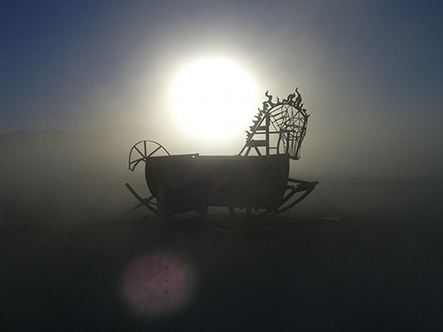The sell out of this year's Burning Man, for
the first time ever, has created a firestorm of debate across the burner
community. The sight of tickets being sold on eBay at around $1000 each has
shaken up the burner ethos of participation and radical inclusion. For the
first time, Burning Man now has to deal seriously with the issue of exclusion.
Many veteran burners are finding themselves without tickets and are faced with
the reality of being turned away.
Despite the rhetoric and philosophy, it is
no secret that at Burning Man some burners are more equal than others. Although
financial exchange is outlawed on the playa, Black Rock City is not an
egalitarian state. The privileges of wealth certainly DO count for something in
the 'gifting economy', where the ability to 'gift' can be reflected in the
subtle hierarchies of theme camps. There are even neighbourhoods with clear
social demographics: upscale
suburbs of luxurious RV's close to the Esplanade and rougher looking shanty
towns and favelas of tents and cars further to the back.
What is new to the equation is that the
most fundamental unit of participation — entry — is now subject to the free
market pressures of supply and demand. The Burning Man organization has (up until
this point) run a pretty successful ticketing strategy with a ‘tier' structure
that incentivizes early ticket purchase. There are also discounted tickets for
those who can prove they are low income and artist bursaries, providing routes
of inexpensive entry for the well prepared, talented and prudent.
What is perhaps most remarkable is that
Burning Man has never sold out before. This new sense of limits creates a whole
new set of issues that it will be interesting to see how the Burning Man
organization and burner community deals with. The word from BMorg is that
security will be 'stepped up' around the borders of the event to deter those
without tickets from thinking about turning up to chance their luck. There has
always been vigilance from the organization about intercepting and holding to
account those who wanted a freebie. However, the ideology behind that policy
was always that it was a necessary evil to create a fair and equal basis of
participation, where everyone shares the basic costs of the event. How will
that figure now the wealthy can buy scalped tickets on internet auction sites,
while veteran burners who left it too late are to be excluded by the Black Rock
sentinels?
Certainly one of the impacts will be for
this year's event to highlight the unspoken divides that exists in American
society, in this case between the very privileged that inhabit the temporary
utopia of this year's edition of Black Rock City and not quite as privileged
who would like to, but missed the boat/can't afford scalped tickets. As one
person put it, 'Burning Man; the most diverse group of white people anywhere.'
Will this year's event, whose theme is 'rites of passage', be a guilty pleasure
for those attending? Knowing that friends and family who missed out are watching
a tiny webcam broadcasting grainy postage stamp-sized footage from the playa,
it might be. Although some smug ticket holders have taken up the stance of 'you
snooze, you lose' in online comments, the divide is real and cuts deep. Why
should we care? Perhaps because the ethos of Burning Man is one of the most
potentially transformative of the American experience outside of Black Rock
City. The burn is an induction camp for the world's most capitalist society
into a new value system that transcends the dollar bill. It is a place where
the experience of genuine community can be co-created and radical self-reliance
road tested. At least, it used to be.
The truth is probably that this has been in
the making for some time. The growth phase of Burning Man — 'the boom years'
that may now be past — was in many ways an orgy of conspicuous consumption
glossed with a 'gift economy' window display. Theme camps grew bigger, more
hierarchical, more extravagant, and ever more vainglorious in their preening
displays intended to outdo previous years and rival camps. The competition for
the affections of fickle burners was stacked with increasingly bigger bars,
bigger sound systems, and bigger name DJ line-ups. The Burning Man noughties
were like a warped aping of an indigenous ‘potlatch', where tribal bigwigs
sought to impress their rivals with bigger and better giveaways.
Maybe this year represents a turning point.
Perhaps, the tide is turning back towards a more essential Burning Man
experience that is less showy and puffed up. The Black Rock economy may have
bucked the recession that has blighted the 'default world', but it too is
subject to limits. An excellent blog by Caveat Magister on this subject is
posted on the Burning Man website and makes this point well:
It's surprising that a culture so focused on
sustainability issues wouldn't have already been bracing for this:
scarcity is *the* problem that the sustainability movement is trying to
solve. If there's no scarcity, there's no need for sustainability.
It's only when you have limited resources, limited energy, limited … space …
that you ask "how do we best preserve this?"
While it may be irritating, or even heartbreaking, for
the non-ticketed to experience a newly felt sense of exclusion, the most
divisive issue of the sell out is almost certainly the scalping that is going
on. Other festivals have had to grapple with this. Burning Man could perhaps
learn a trick from Glastonbury Festival. Ticket buyers to the World's largest
music festival have to submit a photo that is then attached to their ticket,
making sale for profit much more difficult. To give the Burning Man
organization credit, they have set up a clear guide for ticket exchanging (at
face value).
In the case of Glastonbury, one of the other answers
to the issue of demand greatly exceeding capacity turned out to create a giant
double wall. At 16 feet high, and
costing well over a $1 million dollars, it gives the whole event the appearance
of being a massive hippie prison camp. Although a huge fence around the Playa
is almost certainly not the solution, if Burning Man fails to address this
issue pro-actively and creatively, it faces a real risk of becoming a
caricature of the anarchic, edgy, and transformative experience it once was.
Then again, this may be already happening despite the best intentions of BMorg.
One eBay listing advertises a deluxe Burning Man
package for 10 friends that includes flying in by helicopter. This 'all-inclusive' offer can be had for a mere $95,000 and includes "lots of decorations
for your bike. We will bring in lights, LEDs, and hot glue guns. You will have
to decorate your own bike to stay with the Burning Man Spirit. Your bike
is YOUR identity." Hopefully this listing is a joke, it certainly reads like
satire. The 'Burning Man Spirit' is a powerful and flexible one and will almost
certainly rise to these challenges. The question is whether or not Burning Man
really can be 'all-inclusive'.













